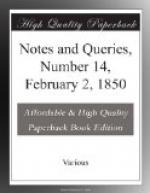Singular Motto.—Being at Cheltenham in the summer of 1811, I saw a chariot standing in an inn yard, on the panels of which, under a coat of arms, apparently belonging to some foreign family, was the following on a scroll, in the nature of a motto:—“oemn3—ononoe.7 ano—7 emn3.” If any of your correspondents can inform me what is its meaning, and if it be a motto, to what family it belongs, he will oblige.
P.H.F.
Stroud.
Sir Stephen Fox.—Will any of your intelligent correspondents inform me whether Sir Stephen Fox, the ancestor of the present Lord Holland and the Earl of Ilchester, had any brothers or sisters, and if so, whether they had any children, and who are the legal representatives of those collateral branches, if any?
VULPES. {215}
Antony Alsop.—Will any of your correspondents kindly tell me who Antony Alsop was? A thin Quarto volume of Latin Odes was published in 1753, with the following title: “Antonii Alsopi AEdis Christi olim Alumni Ordarum Libri Duo,” Londoni, 1753. They are extremely elegant, and deserving the attention of all lovers of Latin poetry. I have also another volume, “Latin and English Poems, by a Gentleman of Trinity College, Oxford,” Quarto London, 1738. In this latter volume, with but two or three exceptions, the poems are very obscene, yet I find one or two of Alsop’s odes in it. Could any of your readers tell me if both volumes are by the same author? Was Alsop at Trinity College and subsequently a student of Christ Church?
R.H.
Derivations of “Calamity,” and “Zero;” and meaning of “Prutenicae".—Will some of your correspondents give the derivations of Calamity and Zero; also the meaning of the word Prutenicae, used by Erasmus Rheinholt, in his astronomical work on the Motions of the Heavenly Bodies?
F.S. MARTIN.
Jew’s-Harp.—What is the origin of the term Jew’s-Harp, applied to a well-known musical toy?
MELANION.
Sir G. Wyattville.—J.P. would be glad to be informed in what year Sir G. Wyattville was knighted?
Sparse.—As I am “less an antique Roman than a Dane,” I wish to know what authority there is for the use of this word, which is to be found in a leading article of The Times, January 8th, 1850?—“A sparse and hardy race of horsemen.” I should like to see this among the Queries, but I send it as a protest.
“Hostis et Peregrinus unus et idem.”
C. FORBES.
The word “Peruse."—I find the word Peruse employed as a substantive, and apparently as equivalent to Examination, in the following part of a sentence in the martyr Fryth’s works, Russell’s ed., p. 407.:—“He would have been full sore ashamed so to have overseen himself at Oxford, at a peruse.”
Can any of your correspondents cite a corresponding instance of its use, or say whether it is still retained at Oxford as the name of any academic exercise?




